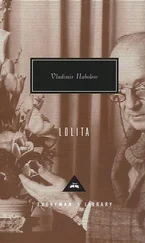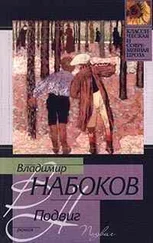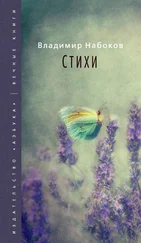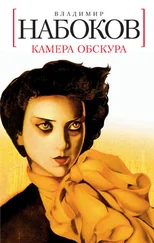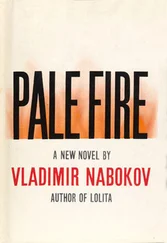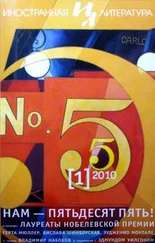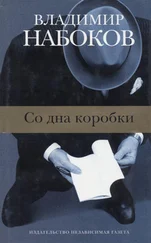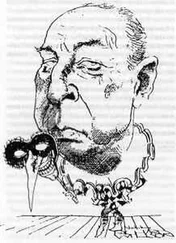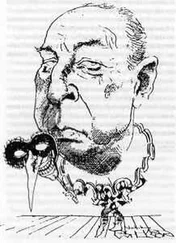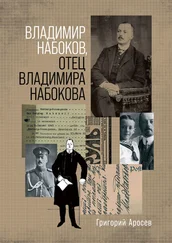Владимир Набоков - [Proofed to line 1994]
Здесь есть возможность читать онлайн «Владимир Набоков - [Proofed to line 1994]» — ознакомительный отрывок электронной книги совершенно бесплатно, а после прочтения отрывка купить полную версию. В некоторых случаях можно слушать аудио, скачать через торрент в формате fb2 и присутствует краткое содержание. Жанр: Классическая проза, на английском языке. Описание произведения, (предисловие) а так же отзывы посетителей доступны на портале библиотеки ЛибКат.
- Название:[Proofed to line 1994]
- Автор:
- Жанр:
- Год:неизвестен
- ISBN:нет данных
- Рейтинг книги:3 / 5. Голосов: 1
-
Избранное:Добавить в избранное
- Отзывы:
-
Ваша оценка:
- 60
- 1
- 2
- 3
- 4
- 5
[Proofed to line 1994]: краткое содержание, описание и аннотация
Предлагаем к чтению аннотацию, описание, краткое содержание или предисловие (зависит от того, что написал сам автор книги «[Proofed to line 1994]»). Если вы не нашли необходимую информацию о книге — напишите в комментариях, мы постараемся отыскать её.
[Proofed to line 1994] — читать онлайн ознакомительный отрывок
Ниже представлен текст книги, разбитый по страницам. Система сохранения места последней прочитанной страницы, позволяет с удобством читать онлайн бесплатно книгу «[Proofed to line 1994]», без необходимости каждый раз заново искать на чём Вы остановились. Поставьте закладку, и сможете в любой момент перейти на страницу, на которой закончили чтение.
Интервал:
Закладка:
Despite a wobbly heart (see line 735), a slight limp, and a certain curious contortion in his method of progress, Shade had an inordinate liking for long walks, but the snow bothered him, and he preferred, in winter, to have his wife call for him after classes with the car. A few days later, as I was about to leave Parthenocissus Hall - or Main Hall (or now Shade Hall, alas), I saw him waiting outside for Mrs. Shade to fetch him. I stood beside him for a minute, on the steps of the pillared porch, while pulling my gloves on, finger by finger, and looking away, as if waiting to review a regiment: "That was a thorough job," commented the poet. He consulted his wrist watch. A snowflake settled upon it. "Crystal to crystal," said Shade. I offered to take him home in my powerful Kramler. "Wives, Mr. Shade, are forgetful." He cocked his shaggy head to look at the library clock. Across the bleak expanse of snow-covered turf two radiant lads in colorful winter clothes passed, laughing and sliding. Shade glanced at his watch again and, with a shrug, accepted my offer.
I wanted to know if he did not mind being taken the longer way, with a stop at Community Center where I wanted to buy some chocolate-coated cookies and a little caviar. He said it was fine with him. From the inside of the supermarket, through a plate-glass window, I saw the old chap pop into a liquor store. When I returned with my purchases, he was back in the car, reading a tabloid newspaper which I had thought no poet would deign to touch. A comfortable burp told me he had a flask of brandy concealed about his warmly coated person. As we turned into the driveway of his house, we saw Sybil pulling up in front of it. I got out with courteous vivacity. She said: "Since my husband does not believe in introducing people, let us do it ourselves: You are Dr. Kinbote, aren't you? And. I am Sybil Shade." Then she addressed her husband saying he might have waited in his office another minute: she had honked and called, and walked all the way up, et cetera. I turned to go, not wishing to listen to a marital scene, but she called me back: "Have a drink with us," she said, "or rather with me, because John is forbidden to touch alcohol." I explained I could not stay long as I was about to have a kind of little seminar at home followed by some table tennis, with two charming identical twins and another boy, another boy.
Henceforth I began seeing more and more of my celebrated neighbor. The view from one of my windows kept providing me with first-rate entertainment, especially when I was on the wait for some tardy guest. From the second story of my house the Shades' living-room window remained clearly visible so long as the branches of the deciduous trees between us were still bare, and almost every evening I could see the poet's slippered foot gently rocking. One inferred from it that he was sitting with a book in a low chair but one never managed to glimpse more than that foot and its shadow moving up and down to the secret rhythm of mental absorption, in the concentrated lamplight. Always at the same time the brown morocco slipper would drop from the wool-socked foot which continued to oscillate, with, however, a slight slackening of pace. One knew that bedtime was closing in with all its terrors; that in a few minutes the toe would prod and worry the slipper, and then disappear with it from my golden field of vision traversed by the black bendlet of a branch. And sometimes Sybil Shade would trip by with the velocity and swinging arms of one flouncing out in a fit of temper, and would return a little later, at a much slower gait, having, as it were, pardoned her husband for his friendship with an eccentric neighbor; but the riddle of her behavior was entirely solved one night when by dialing their number and watching their window at the same time I magically induced her to go through the hasty and quite innocent motions that had puzzled me.
Alas, my peace of mind was soon to be shattered. The thick venom of envy began squirting at me as soon as academic suburbia realized that John Shade valued my society above that of all other people. Your snicker, my dear Mrs. C., did not escape our notice as I was helping the tired old poet to find his galoshes after that dreary get-together party at your house. One day I happened to enter the English Literature office in quest of a magazine with the picture of the Royal Palace in Onhava, which I wanted my friend to see, when I overheard a young instructor in a green velvet jacket, whom I shall mercifully call Gerald Emerald, carelessly saying in answer to something the secretary had asked: "I guess Mr. Shade has already left with the Great Beaver." Of course I am quite tall, and my brown beard is of a rather rich tint and texture; the silly cognomen evidently applied to me, but was not worth noticing, and after calmly taking the magazine from a pamphlet-cluttered table, I contented myself on my way out with pulling Gerald Emerald's bow-tie loose with a deft jerk of my fingers as I passed by him. There was also the morning when Dr. Nattochdag, head of the department to which I was attached, begged me in a formal voice to be seated, then closed the door, and having regained, with a downcast frown, his swivel chair, urged me "to be more careful." In what sense, careful? A boy had complained to his adviser. Complained of what, good Lord? That I had criticized a literature course he attended ("a ridiculous survey of ridiculous works, conducted by a ridiculous mediocrity"). Laughing in sheer relief, I embraced my good Netochka, telling him I would never be naughty again. I take this opportunity to salute him. He always behaved with such exquisite courtesy toward me that I sometimes wondered if he did not suspect what Shade suspected, and what only three people (two trustees and the president of the college) definitely knew.
Oh, there were many such incidents. In a skit performed by a group of drama students I was pictured as a pompous woman hater with a German accent, constantly quoting Housman and nibbling raw carrots; and a week before Shade's death, a certain ferocious lady at whose club I had refused to speak on the subject of "The Hally Vally" (as she put it, confusing Odin's Hall with the title of a Finnish epic), said to me in the middle of a grocery store, "You are a remarkably disagreeable person. I fail to see how John and Sybil can stand you," and, exasperated by my polite smile, she added: "What's more, you are insane." But let me not pursue the tabulation of nonsense. Whatever was thought, whatever was said, I had my full reward in John's friendship. This friendship was the more precious for its tenderness being intentionally concealed, especially when we were not alone, by that gruffness which stems from what can be termed the dignity of the heart. His whole being constituted a mask. John Shade's physical appearance was so little in keeping with the harmonies hiving in the man, that one felt inclined to dismiss it as a coarse disguise or passing fashion; for if the fashions of the Romantic Age subtilized a poet's manliness by baring his attractive neck, pruning his profile and reflecting a mountain lake in his oval gaze, present-day bards, owing perhaps to better opportunities of aging, look like gorillas or vultures. My sublime neighbor's face had something about it that might have appealed to the eye, had it been only leonine or only Iroquoian; but unfortunately, by combining the two it merely reminded one of a fleshy Hogarthian tippler of indeterminate sex. His misshapen body, that gray mop of abundant hair, the yellow nails of his pudgy fingers, the bags under his lusterless eyes, were only intelligible if regarded as the waste products eliminated from his intrinsic self by the same forces of perfection which purifed and chiseled his verse. He was his own cancellation.
I have one favorite photograph of him. In this color snapshot taken by a onetime friend of mine, on a brilliant spring day, Shade is seen leaning on a sturdy cane that had belonged to his aunt Maud (see line 86). I am wearing a white windbreaker acquired in a local sports shop and a pair of lilac slacks hailing from Cannes. My left hand is half raised - not to pat Shade on the shoulder as seems to be the intention, but to remove my sunglasses which, however, it never reached in that life, the life of the picture; and the library book under my right arm is a treatise on certain Zemblan calisthenics in which I proposed to interest that young roomer of mine who snapped the picture. A week later he was to betray my trust by taking sordid advantage of my absence on a trip to Washington whence I returned to find he had been entertaining a fiery-haired whore from Exton who had left her combings and reek in all three bathrooms. Naturally we separated at once, and through a chink in the window curtains I saw bad Bob standing rather pathetically, with his crewcut, and shabby valise, and the skis I had given him, all forlorn on the roadside, waiting for a fellow student to drive him away forever. I can forgive everything save treason.
Читать дальшеИнтервал:
Закладка:
Похожие книги на «[Proofed to line 1994]»
Представляем Вашему вниманию похожие книги на «[Proofed to line 1994]» списком для выбора. Мы отобрали схожую по названию и смыслу литературу в надежде предоставить читателям больше вариантов отыскать новые, интересные, ещё непрочитанные произведения.
Обсуждение, отзывы о книге «[Proofed to line 1994]» и просто собственные мнения читателей. Оставьте ваши комментарии, напишите, что Вы думаете о произведении, его смысле или главных героях. Укажите что конкретно понравилось, а что нет, и почему Вы так считаете.

